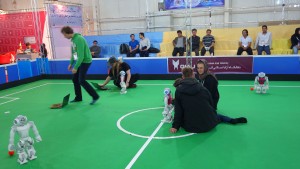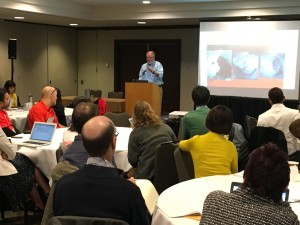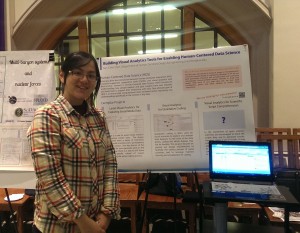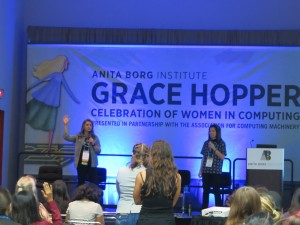The 2015 Grace Hopper Celebration (GHC) brought together 12,000 attendees in Houston this October to celebrate women in computing and technology. GHC is known for attracting outstanding technologists from academia and industry to share their research and insights for professional development. This year the conference offered 15 tracks including Data Science, Human Computer Interaction, and Emerging Technologies. GHC also features a career and community fair with hundreds of companies, universities, and non-profit organizations represented.
Cecilia Aragon co-led a workshop for graduate students as part of the series in the Career Track presented by the Computing Research Association’s Committee on the Status of Women in Computing Research (CRA-W). The workshop, co-led by Patty Lopez of Intel Corporation, focused on helping graduate students build self-confidence and make progress toward their ideal careers. Both speakers shared personal experiences of overcoming fear and institutional biases. They proposed “3 steps to success” for graduate students: 1) working every day to overcome fears, 2) relying on teachers, mentors, and friends for support, and 3) pursuing research topics that are personally interesting, regardless of the current trends. In the interactive portion of the workshop, participants worked with partners to describe their ideal career paths, three “super powers,” and fears. They also brainstormed measurable ways to work on overcoming their fears and self-doubt every day. The workshop reinforced the general themes of GHC, offering insightful advice and building up a supportive community of women in technology.
HDS PhD students Nan-Chen Chen and Meg Drouhard also attended the conference, Nan-Chen as a GHC Scholar and Meg as a poster presenter for the ACM Student Research Competition.
Posted by Cecilia Aragon
on July 09, 2015
News /
Comments Off on Lab members’ research on thermostat usage gets published and covered by media

HDS Lab Director Cecilia Aragon and Lab Member Daniel Perry co-authored a paper along with Marco Pritoni, Alan K. Meier, and Therese Peffer that was recently published in the journal, Energy Research & Social Science and covered in The Washington Post.
The study, “Energy efficiency and the misuse of programmable thermostats: The effectiveness of crowdsourcing for understanding household behavior,” recruited participants from the crowdsourcing service Mechanical Turk. These participants self-reported thermostat usage and took pictures of their programmable thermostats. The researchers found that misunderstanding and misuse of programmable thermostats was widespread, undermining their potential to contribute to energy efficiency and cost savings.
The research also revealed flaws in self-reported survey data, which raises questions about the validity of thermostat-related studies that rely solely on traditional surveys. And compared to traditional surveys, this crowdsourcing method allowed the study to be completed rapidly and at low cost.
Citation:
Pritoni, M; Meier, A. K.; Aragon, C.; Perry, D.; Peffer, T. (2015). Energy efficiency and the misuse of programmable thermostats: The effectiveness of crowdsourcing for understanding household behavior. Energy Research & Social Science, 8, 190-197.
Posted by Cecilia Aragon
on May 07, 2015
News /
Comments Off on Katerena Kuksenok participates in international humanoid robotic soccer competitions
HDS Lab member Katerena Kuksenok recently returned from travels that took her all over the world in the name of research. In mid-March, she attended the Computer Supported Cooperative Work Doctoral Colloquium in Canada to get feedback and critique on her dissertation proposal (extended abstract PDF). From there, she was off to Germany to join the Berlin United Nao Team Humbolt (NaoTH), which traveled together to Tehran to compete in the IranOpen humanoid robotic soccer competition. The team took a couple of weeks to travel around Iran, which they found to be a beautiful, friendly, and fascinating country. Then they returned to Germany for the GermanOpen in Magdeburg, another humanoid robotic soccer competition. There, the team slept in a hostel with quite a lot of goats and sheep, and a very pretty calf, and spent all waking hours eating and working in the conference center. So, Katerena has no idea about the rest of Magdeburg, which is probably not just a stretch of pleasant German countryside. In both Tehran and Madgeburg, the NaoTH team earned third place, though the GermanOpen match was so close (see 8:00 and on for the heat and the drama) that it necessitated an awkward, hilarious penalty shoot-out: the penalty shooter code had never been tested in a competition, and was written a year ago.

Posted by Cecilia Aragon
on May 07, 2015
News /
Comments Off on Daniel Perry presents at Bio-IT Conference & Expo
HDS Lab member Daniel Perry recently attended the Bio-IT Conference & Expo in Boston and delivered a talk called, “Human-Centered Game Design for Science Learning Games: A Bioinformatics Game Case Study.” His presentation provided a case study of the game MAX5, a bioinformatics learning game designed for youth. Daniel discussed a human centered design process as an applicable approach to the creative design of science games for diverse player types.
Posted by Cecilia Aragon
on May 05, 2015
News /
Comments Off on Cecilia Aragon invited to speak on data science at two South American universities
Lab Director and HCDE Professor Cecilia Aragon was recently invited to present seminars on data science at the two leading universities in Chile. She gave an invited talk on human-centered data science at the Millennium Project in Semantic Web Research (http://ciws.cl) at the University of Chile and then presented an interactive seminar on applications of human-centered data science to business and innovation in the Innovation Center at the Pontificia Universidad Católica de Chile. During her stay in Santiago, Aragon collaborated with researchers in the Department of Computer Science and the Center for Mathematical Modeling at the University of Chile and in the School of Design and Business School at the Universidad Católica.

Santiago, Chile

 HDS Lab PhD student Nan-Chen Chen participated in the UW Data Science Poster and Networking Session held on February 10th. The campus-wise event provided an opportunity to share work with the academic community and regional partners, and to connect with other people who work in data-intensive domains. Her poster, Building Visual Analytics Tools for Enabling Human-Centered Data Science, briefly introduced the domain of Human-Centered Data Science (HDS) and illustrated a few visual analytics projects she has been working on. The PDF file of her poster can be found
HDS Lab PhD student Nan-Chen Chen participated in the UW Data Science Poster and Networking Session held on February 10th. The campus-wise event provided an opportunity to share work with the academic community and regional partners, and to connect with other people who work in data-intensive domains. Her poster, Building Visual Analytics Tools for Enabling Human-Centered Data Science, briefly introduced the domain of Human-Centered Data Science (HDS) and illustrated a few visual analytics projects she has been working on. The PDF file of her poster can be found 





